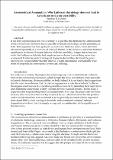Asymmetrical assumption : why Lutheran christology does not lead to kenoticism or divine passibility
Abstract
It has been commonplace for over a century to argue that the distinctively Lutheran form of the communicatio idiomatum leads naturally to kenotic christology, divine passibility, or both. Although this argument has been generally accepted as a historical claim, has also been advanced repeatedly as a criticism of ‘classical theism’ and has featured significantly in almost all recent defences of divine passibility, I argue that it does not work: the Lutheran scholastics had ample resources drawn from nothing more than ecumenical trinitarian and christological dogma to defend their denial of the genus tapeinoticum. I argue further that this defence, if right, undermines a remarkably wide series of proposals in contemporary systematic theology.
Citation
Holmes , S R 2019 , ' Asymmetrical assumption : why Lutheran christology does not lead to kenoticism or divine passibility ' , Scottish Journal of Theology , vol. 72 , no. 4 , pp. 357-374 . https://doi.org/10.1017/S0036930619000589
Publication
Scottish Journal of Theology
Status
Peer reviewed
ISSN
0036-9306Type
Journal article
Collections
Items in the St Andrews Research Repository are protected by copyright, with all rights reserved, unless otherwise indicated.

